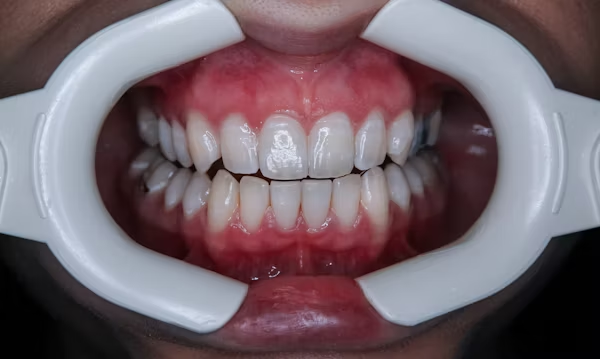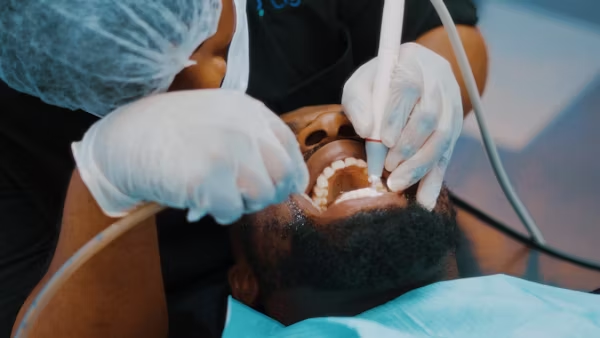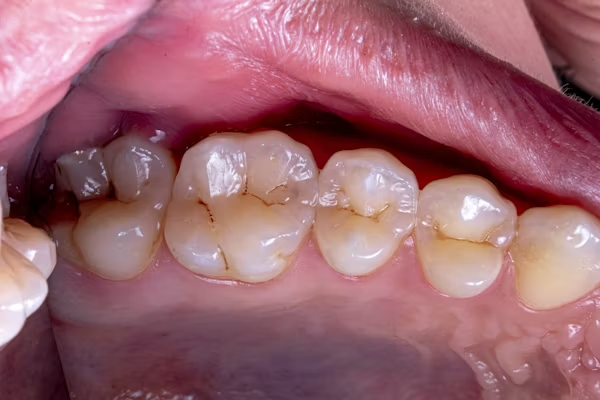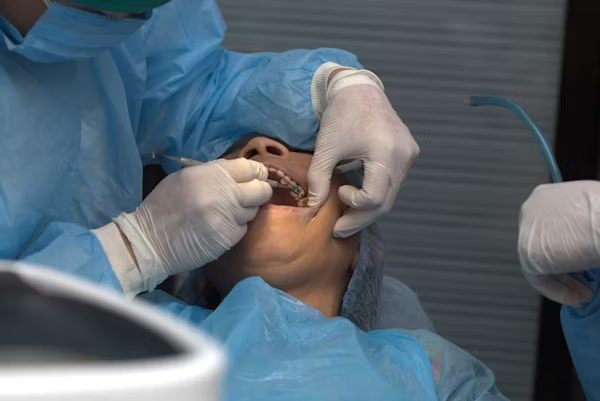Cosmetic Bonding

Cosmetic Bonding
General Dentistry Services:
1. Dental Checkups and Oral Exams:
Routine dental examinations are the foundation of preventive dentistry.
They help detect early signs of cavities, gum disease, oral cancer, and other dental issues.
How It Works:
- Visual Examination: Dentist checks teeth, gums, tongue, and mouth.
- X-Rays: Take radiographs to detect hidden decay or bone issues.
- Assessment: Evaluate bite, oral hygiene, and risk factors.
- Advice and Planning: Recommendations for treatment, cleaning, or preventive measures.
Emergency Dental Care Services:
1. Toothache and Severe Pain Management:
Sudden and severe tooth pain is one of the most frequent dental emergencies.
It may be caused by cavities, tooth decay, gum infection, cracked teeth, or exposed tooth roots.
How It Is Treated:
- Diagnosis: The dentist examines the tooth using X-rays and clinical evaluation.
- Immediate Relief: Painkillers and numbing agents are given to ease discomfort.
Treatment Options:
- Filling or crown for cavities.
- Root canal therapy if the pulp is infected.
- Extraction if the tooth cannot be saved.
Why It’s Important:
- Ignoring severe pain may allow infection to spread into gums, jawbone, or bloodstream (causing abscess or sepsis).
- Timely treatment prevents complications and restores comfort.
2. Broken, Chipped, or Fractured Teeth:
- Accidents, falls, sports injuries, or chewing hard objects can lead to chipped or fractured teeth.
- Damage can be cosmetic or structural, sometimes exposing the nerve inside.
How It Is Treated:
- Small Chips: Smoothed and restored with dental bonding or composite filling.
- Moderate Fractures: Covered with a crown or veneer for strength and appearance.
- Severe Breaks: May require a root canal before placing a crown, or extraction if unsalvageable.
Why It’s Important:
- Broken teeth can cause pain, sensitivity, and infection if untreated.
- Emergency care restores appearance, function, and prevents further damage.
3. Knocked-Out (Avulsed) Tooth:
- A knocked-out tooth (commonly due to accidents or sports injuries) is a true dental emergency.
- The chances of saving the tooth are highest if treated within 30–60 minutes.
How It Is Treated:
- Reimplantation: If the tooth is preserved in milk or saline and brought quickly, dentists may reinsert it into the socket.
- Splinting: The tooth is stabilized with a splint to nearby teeth for healing.
- Replacement: If saving is not possible, options include dental implants, bridges, or dentures.
Why It’s Important:
- Immediate attention can often save the natural tooth.
- Delays may result in permanent tooth loss, affecting chewing ability and smile aesthetics.
4. Dental Abscess and Infections:
- An abscess is a pocket of pus caused by bacterial infection, usually at the root of a tooth or gum line.
- It causes throbbing pain, swelling, fever, and can spread to other parts of the body.
How It Is Treated:
- Drainage: The dentist drains the pus to relieve pressure.
- Antibiotics: Prescribed to control infection spread.
- Definitive Treatment:
- Root canal therapy if the tooth is salvageable.
- Extraction if the tooth is severely damaged.
Why It’s Important:
- Untreated abscesses can lead to severe infections in the jawbone or bloodstream.
- Quick intervention prevents life-threatening complications.
5. Lost or Damaged Dental Restorations:
- Crowns, bridges, and fillings may become loose or fall out unexpectedly due to wear, decay under the restoration, or trauma.
- This can leave the tooth exposed, sensitive, and vulnerable to further damage.
How It Is Treated:
- Temporary Fix: Dentists may apply temporary cement or filling to protect the tooth.
- Permanent Solution: Re-cementing the original crown or bridge if intact.
- Creating a new restoration if the old one is damaged.
- Placing a protective crown over a tooth with a lost filling.
Why It’s Important:
- Restorations protect natural teeth from breaking and infection.
- Immediate care prevents sensitivity, discomfort, and decay progression.
- Routine preventive care for children and adults.
- Early detection of oral diseases.
- Maintaining long-term dental health.
Advantages:
- Prevents severe dental problems.
- Saves time and cost by catching issues early.
- Promotes overall oral and systemic health.
2. Teeth Cleaning (Prophylaxis):
Professional teeth cleaning removes plaque, tartar, and stains that cannot be removed by regular brushing or flossing.
How It Works:
- Scaling: Remove plaque and tartar from tooth surfaces using ultrasonic or manual tools.
- Polishing: Smooth teeth surfaces to prevent future plaque accumulation.
- Fluoride Application: Strengthens enamel and protects against cavities (optional).
Best For:
- Preventing cavities, gum disease, and bad breath.
- Maintaining oral hygiene in adults and children.
Advantages:
- Reduces risk of gum disease and tooth decay.
- Improves breath and teeth appearance.
- Maintains healthy gums and teeth longevity.
3. Fillings (Restorative Dentistry):
- Fillings restore teeth damaged by decay, cracks, or minor trauma.
How It Works:
- Diagnosis: Identify cavities or damaged areas.
- Decay Removal: Remove decayed tooth material using dental drills.
- Filling Placement: Fill the cavity with composite resin, amalgam, or other materials.
- Shaping and Polishing: Ensure proper bite and smooth surface.
Best For:
- Treating cavities or small fractures.
- Preserving natural tooth structure.
Advantages:
- Restores tooth function and strength.
- Prevents further decay and damage.
- Maintains natural tooth aesthetics.
4. Tooth Extractions:
Tooth extraction is the removal of a damaged, decayed, or impacted tooth. It is often a last resort when the tooth cannot be saved.
How It Works:
- Assessment: X-rays and examination to determine extraction complexity.
- Anesthesia: Local anesthesia or sedation applied for patient comfort.
- Extraction: Tooth is loosened and removed using specialized instruments.
All Service Categories
Recent Post
Book An Appointment
Emergency Toothache?
Same day appointment available! Call us now: (425) 430-2029.
Schedule your next visit!
Your dental health, comfort, and safety are top priorities for Bright Trust Dental - whether you are having routine cleaning or a root canal or a dental implant. Comprehensive service offering, state-of-the-art offices, and caring staff set us a part.
Appointments
You can now book the following appointments quickly and easily (online or give us):
- Emergency Dental Appointment
- New Patient Exam & Cleaning
- Second Opinion Services
- Routine Appointment Request












